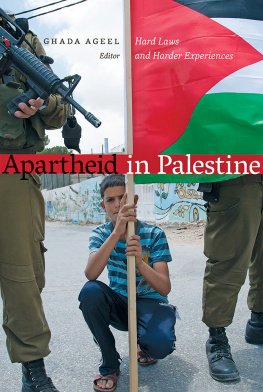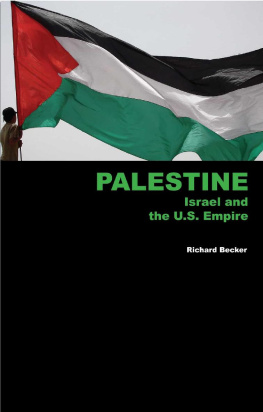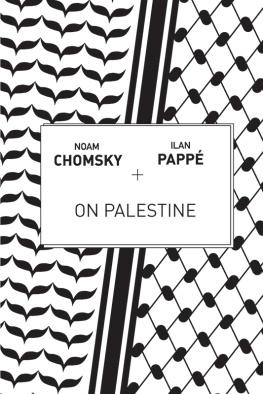
Published by
The University of Alberta Press
Ring House 2
Edmonton, Alberta, Canada T6G 2E1
www.uap.ualberta.ca
Copyright 2016 Ghada Ageel
LIBRARY AND ARCHIVES CANADA CATALOGUING IN PUBLICATION
Apartheid in Palestine : hard laws and harder experiences / Ghada Ageel, editor.
Includes bibliographical references and index.
Issued in print and electronic formats.
ISBN 9781772120820 (paperback).ISBN 9781772121018 (EPUB).ISBN 9781772121025 (kindle).ISBN 9781772121032 (PDF)
1. Israelis Colonization Palestine. 2. Palestinian Arabs IsraelRelocation. 3. Palestinian ArabsLegal status, laws, etc.Israel. 4. SegregationIsrael. 5. Arab-Israeli conflict1993. 6. IsraelEthnic relations. I. Ageel, Ghada, 1970, editor
| DS113.7.A63 2015 |
| 956.940049274 | C20159071488 |
| C20159071496 |
First edition, rst printing, 2016.
First electronic edition, 2016.
Digital conversion by Transforma Pvt. Ltd.
Copyediting and proofreading by Joanne Muzak.
Maps by Wendy Johnson.
Indexing by Adrian Mather.
Cover design by Alan Brownoff.
All rights reserved. No part of this publication may be reproduced, stored in a retrieval system, or transmitted in any form or by any means (electronic, mechanical, photocopying, recording, or otherwise) without prior written consent. Contact the University of Alberta Press for further details.
The University of Alberta Press supports copyright. Copyright fuels creativity, encourages diverse voices, promotes free speech, and creates a vibrant culture. Thank you for buying an authorized edition of this book and for complying with the copyright laws by not reproducing, scanning, or distributing any part of it in any form without permission. You are supporting writers and allowing University of Alberta Press to continue to publish books for every reader.
The University of Alberta Press gratefully acknowledges the support received for its publishing program from the Government of Canada, the Canada Council for the Arts, and the Government of Alberta through the Alberta Media Fund.
This book has been published with the help of a grant from the Canadian Federation for the Humanities and Social Sciences, through the Awards to Scholarly Publications Program, using funds provided by the Social Sciences and Humanities Research Council of Canada.

Excerpts from Maps of Womens Goings and Stayings by Rela Mazali Copyright by the Board of Trustees of the Leland Stanford Jr. University. All rights reserved. Used with the permission of Stanford University Press, www.sup.org
Cover photo: Palestinian activists confront Israeli soldiers during the weekly demonstration against the Israeli separation barrier in the West Bank village of Al Masara, June 6, 2014. The separation barrier would cut off the village from its agricultural lands if it is built as planned. Photo by Ryan Rodrick Beiler/Activestills. Used by permission.
This book is dedicated to every woman, man, and child in Gaza, in recognition of the steadfast resilience with which they have shaped an unprecedented chapter of human history. Through the people of Gaza, it honours all Palestinians in historic Palestine and in exile. My heart is full of love for Gaza.
Contents
RICHARD FALK
Once upon a Land
GHADA AGEEL
REEM SKEIK
Via Dolorosa
SAMAR EL-BEKAI
Uniting the Palestinian Narrative
RAMZY BAROUD
HUWAIDA ARRAF
Notes on the Boycott, Divestment, and Sanctions Movement
RAFEEF ZIADAH
Why We Need You to Boycott, Divest, and Sanction Israel
TALI SHAPIRO
A Story and Its Context
RELA MAZALI
Time for a European Moratorium
KEITH HAMMOND
ABIGAIL B. BAKAN & YASMEEN ABU-LABAN
The Case of Pro-Palestine Discourse in Canada
JAMES CAIRNS & SUSAN FERGUSON
The Spatiality of Occupied Palestine
SHERENE RAZACK
A Framework for Legal Analysis
EDWARD C. CORRIGAN
Foreword
RICHARD FALK
May 2015
FROM MANY POINTS OF VIEW, the struggle between Jews and Arabs over historic Palestine, which has gone on for almost a century, is at a critical juncture. Since the early 1990s, most hopes for a peaceful resolution of the conflict depended on a diplomatic framework agreed upon in Oslo and solemnized by the infamous 1993 White House handshake between Yitzhak Rabin and Yasser Arafat, with a smiling Bill Clinton standing tall between these embattled leaders. As of now, there is a widespread realization that diplomacy cannot under present conditions produce a sustainable peace for the parties. This became clear when negotiations collapsed in April 2014, ending what Secretary of State John Kerry insisted was the last chance to realize a two-state solution. Although the United States may again try to push the parties to engage in direct negotiations, it would seem more for the sake of public relations than to find an end to the conflict.
This Oslo framework was so one-sided from the outset as to seem structurally incapable of ever producing a fair outcome, given the bisecting of Occupied Palestine, splitting the West Bank from Gaza, entrusting partisan United States with the honest broker role, failing even to affirm a Palestinian right of self-determination, and the exclusion of international law from the negotiations. Excluding international law may have been most damaging bias of all, allowing the Israelis to continue their unlawful land grabbing encroachment on post-1967 Palestine (expanding settlements; building the separation barrier, and constructing a network of settler only roads), with the United States using its geopolitical muscle to insulate Israel from any adverse consequences through the years.
So, with Oslo in shambles, new tendencies on both sides are becoming evident.
Israeli internal politics have been drifting further and further to the right and seem on the verge of producing a consensus that will favour a unilaterally imposed solution that will leave the Palestinians squeezed either into barren Bantustans on the West Bank or incorporated into an Israeli one-state solution, in which the best that they can hope for is to be treated decently as second-class citizens in a self-proclaimed Israeli ethnocracy. Beyond this, even these diminished democratic elements in the Israeli reality would be threatened by the prospects of a Palestinian majority, leading many prominent Israelis to throw their democratic pretensions under the bus of ethnic privilege. The Knesset signalled the adoption of such an approach when it elected Reuven Rivlin, a fierce advocate of a single Israeli state encompassing the entirety of Palestine, as president of Israel. To be sure, liberal-minded Israeli Zionists, among them distinguished novelist Amos Oz, are worried by these developments, warning that, however belatedly, Israels only hope for real peace is to accept a viable Palestinian sovereign state on its borders, but it seems as if such concerns are politically irrelevant voices in the wilderness.
On the Palestinian side, the relevant discussions are more in the realm of aspirations, pinning hopes on a renewed cycle of intensifying resistance by an array of non-violent tactics and bolstered by a growing global solidarity movement that follows the tactics and guidance of Palestinian civil society leaders. If such an assessment is correct, it represents something quite new, shifting the locus of expectations from the level of governments to that of people and popular mobilization. In these respects, the formal governmental actors have become marginalized, with the Palestinian Authority compromised due to its partially collaborative and dependent relationship with Israel and the United States, and Hamas limited in its capacity to provide international leadership, although its leaders have repeatedly expressed their readiness for long-term peaceful coexistence with Israel. The question is whether such a globally based and populist Palestinian national movement can exert sufficient pressure on the Israeli established order to force a recalculation of interests in Tel Aviv, a process comparable to what occurred so dramatically in South Africa two decades ago, a drastic change by the governing white elite that was signalled there by the utterly surprising release from prison of Nelson Mandela, who was up until then alleged to be South Africas number one terrorist.
Next page











